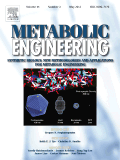
Metabolites
Scope & Guideline
Pioneering insights into metabolic processes.
Introduction
Aims and Scopes
- Metabolomic Profiling:
The journal emphasizes the use of advanced metabolomic techniques, including NMR, LC-MS, and GC-MS, to profile metabolites in various biological samples, thereby uncovering insights into metabolic pathways and disease states. - Integrative Omics Approaches:
It promotes research that integrates metabolomics with other omics disciplines (genomics, proteomics) to provide a holistic understanding of biological processes and disease mechanisms. - Clinical and Translational Research:
A significant focus is on the clinical implications of metabolomics, including biomarker discovery for diseases like cancer, diabetes, and cardiovascular conditions, facilitating the translation of research findings into clinical practice. - Environmental and Ecological Metabolomics:
The journal also explores the impact of environmental factors on metabolite production in plants and microorganisms, highlighting the intersection between ecology and metabolomics. - Innovative Methodologies:
'Metabolites' encourages the development and application of novel analytical techniques and computational methods for metabolomic data analysis, enhancing reproducibility and data interpretation.
Trending and Emerging
- Machine Learning in Metabolomics:
The application of machine learning techniques for data analysis and interpretation in metabolomics is rapidly increasing, driven by the need for advanced computational tools to handle complex datasets. - Microbiome-Metabolome Interactions:
Research exploring the interplay between gut microbiota and host metabolism is on the rise, highlighting the significance of microbial metabolites in health and disease. - Metabolomics in Precision Medicine:
There is a growing emphasis on using metabolomic data to inform personalized medicine strategies, particularly in chronic diseases such as diabetes and cancer, thereby enhancing treatment efficacy. - Environmental Metabolomics:
Emerging studies are focusing on the effects of environmental stressors on plant and microbial metabolomes, indicating a shift towards understanding ecological impacts on metabolic processes. - Integration of Multi-Omics Data:
The trend towards integrating metabolomics with genomics, proteomics, and transcriptomics is becoming more prevalent, enabling comprehensive insights into metabolic regulation and disease mechanisms.
Declining or Waning
- Basic Metabolic Pathway Studies:
Research focusing solely on basic metabolic pathways without clinical or applied implications appears to be declining, as the field moves towards more integrative and translational research. - Animal Models in Metabolomics:
There is a noticeable decrease in studies using traditional animal models without innovative applications, as researchers increasingly favor more complex models or human studies that provide direct clinical relevance. - Single-Metabolite Studies:
Research concentrating on the effects or roles of single metabolites, rather than comprehensive metabolomic profiles or networks, has become less common as the field emphasizes the importance of holistic approaches. - Static Analytical Techniques:
Publications utilizing older, less dynamic analytical methodologies are waning, as the field increasingly adopts high-throughput and more sophisticated techniques for metabolomic analysis.
Similar Journals

MOLECULAR & CELLULAR PROTEOMICS
Pioneering insights into the world of proteins.MOLECULAR & CELLULAR PROTEOMICS, published by Elsevier, stands as a premier journal in the fields of Biochemistry, Analytical Chemistry, and Molecular Biology, with a distinguished Q1 ranking reflecting its high impact and contribution to the scientific community. Established in 2002, this journal has consistently provided a platform for the latest research in protein science, merging molecular biology with advanced analytical techniques. With impressive Scopus rankings—41st in Biochemistry and 16th in Analytical Chemistry—it caters to an audience of researchers, professionals, and students eager to explore cutting-edge developments in proteomics. Although currently not designated as open access, the journal aims to foster knowledge dissemination through accessible research content. As it continues to evolve until 2024, MOLECULAR & CELLULAR PROTEOMICS is essential for anyone passionately engaged in the ever-expanding field of proteomics.

BIOMEDICAL CHROMATOGRAPHY
Elevating Standards in Biomedical Research ExcellenceBiomedical Chromatography is a prestigious journal published by Wiley, focusing on the vital intersections of analytical chemistry, biochemistry, and clinical studies. With an ISSN of 0269-3879 and E-ISSN of 1099-0801, it has served the research community since its inception in 1986. The journal provides a platform for innovative research in areas such as drug discovery and pharmacology, achieving a commendable placement in Q3 across multiple categories in the 2023 metrics, including Analytical Chemistry and Biochemistry. Although it currently does not offer open access, it plays a crucial role in disseminating scientific developments and methodologies that contribute to advancements in health, safety, and pharmaceuticals. Researchers, professionals, and students can anticipate high-quality, peer-reviewed articles that drive forward the collective knowledge in biomedical applications. Located in the United Kingdom at 111 River St, Hoboken, NJ, the journal continues to attract contributions from global thought leaders in the field.

METABOLIC ENGINEERING
Unlocking the Potential of Metabolic EngineeringMETABOLIC ENGINEERING, published by Academic Press Inc. Elsevier Science, is a renowned journal in the fields of Applied Microbiology, Biotechnology, and Bioengineering. With an impressive impact factor and ranking in the top quartile (Q1) across its specialized categories for 2023, this journal facilitates the dissemination of cutting-edge research focused on metabolic pathways and engineering methods that optimize biological systems for various applications. Since its inception in 1999, it has established itself as a critical resource for academics and industry professionals seeking innovative solutions to complex biosynthetic challenges. The journal invites original research, reviews, and technical notes that advance the understanding and utilization of metabolic processes; thus, it plays a pivotal role in bridging laboratory discoveries with practical applications. Although the journal does not offer open access, its high visibility and rigorous peer-review process ensure that it remains a vital source of knowledge and inspiration for researchers and students alike.

JOURNAL OF PROTEOME RESEARCH
Pioneering Discoveries in Proteome ScienceJOURNAL OF PROTEOME RESEARCH is a premier publication in the field of proteomics, disseminating cutting-edge research and methodologies that drive advancements in biochemistry and molecular biology. Published by the American Chemical Society, this esteemed journal boasts a robust impact, as evidenced by its Q1 rankings in both Biochemistry and miscellaneous Chemistry categories for 2023. With a reputation bolstered by a solid Scopus ranking—#64 out of 408 in General Chemistry and #80 out of 438 in Biochemistry—the journal serves as an essential resource for researchers, professionals, and students aiming to deepen their understanding of protein functions and interactions in biological systems. Although it does not operate under an open-access model, the JOURNAL OF PROTEOME RESEARCH remains a critical platform for scholarly discourse, committed to publishing high-quality, peer-reviewed articles through 2024 and beyond. Scholars are encouraged to engage with the pioneering studies and reviews that shape the future of proteomics.

Molecular Omics
Advancing Knowledge in Biochemistry and GeneticsMolecular Omics is a premier, peer-reviewed journal published by the Royal Society of Chemistry, focusing on the interdisciplinary field of molecular biology with significant implications for biochemistry and genetics. With an E-ISSN of 2515-4184, this journal has been dedicated to disseminating high-quality research since its inception in 2018, maintaining an impressive trajectory in academic contributions until 2024. Currently, it holds a Q2 quartile ranking in both Biochemistry and Genetics, alongside a Q3 ranking in Molecular Biology for 2023, highlighting its relevance and influence in these domains. The journal is accessible as an open access publication, promoting the widespread dissemination of groundbreaking research. As part of a vibrant academic community, Molecular Omics aims to bridge fundamental and applied science, appealing to researchers, professionals, and students eager to expand their knowledge on molecular mechanisms and technologies that shape the future of biological research.

Bioscience of Microbiota Food and Health
Championing Excellence in Microbiota Research for Public HealthBioscience of Microbiota Food and Health, an esteemed journal published by BMFH PRESS, serves as a pivotal platform for interdisciplinary research in the expanding fields of applied microbiology, food science, and gastroenterology. Since its inception in 2014, the journal has facilitated a critical exchange of scientific knowledge, promoting advancements in our understanding of microbiota's role in human health and nutrition. With its impressive 2023 category quartile rankings—Q2 in Applied Microbiology and Biotechnology, Food Science, and Gastroenterology—it stands out among its peers, appealing to researchers, professionals, and students alike. The journal does not follow an open-access model, which underscores its exclusivity while maintaining rigorous peer-review standards. Based in Japan, it provides a global forum for innovative studies that advance the field and enhance public health outcomes. As the journal converges into its next decade, it continues to uphold its commitment to disseminating high-quality research that bridges the gap between microbiota, food, and human health.

IUBMB LIFE
Illuminating Pathways in Biochemistry and GeneticsIUBMB LIFE is a prestigious, peer-reviewed journal published by WILEY, dedicated to advancing the fields of biochemistry, molecular biology, and cell biology. With an impressive impact factor and consistently ranked in the Q1 and Q2 categories across multiple relevant disciplines—including Biochemistry, Genetics, and Clinical Biochemistry—this journal has established itself as a leading platform for disseminating innovative research and critical reviews that propel scientific discovery. The journal spans a converged publication period from 1999 to 2024, providing comprehensive insights into the dynamic landscape of biochemical research. Researchers, professionals, and students alike are invited to explore its Open Access options, ensuring that groundbreaking studies are accessible to a global audience. As it continues to shape the future of life sciences, IUBMB LIFE remains a vital resource for those seeking to enrich their understanding and contribute to these rapidly evolving fields.

CURRENT OPINION IN CHEMICAL BIOLOGY
Highlighting Breakthroughs in Chemical BiologyCurrent Opinion in Chemical Biology, published by Elsevier Science Ltd, stands at the forefront of its field, specializing in analytical chemistry and biochemistry. With an impressive impact factor and ranked in the top quartile (Q1) for both its disciplines, this journal consolidates significant advancements and perspectives in chemical biology from 1997 to 2024. Its Scopus rankings reflect its prestigious standing, with the journal positioned at #11 in Analytical Chemistry and #32 in Biochemistry, indicating a remarkable percentile standing of 93rd and 92nd, respectively. With a commitment to highlight cutting-edge research and foster scholarly dialogue, Current Opinion in Chemical Biology serves as an invaluable resource for researchers, professionals, and students seeking to stay abreast of the latest developments and innovations in the chemical biology landscape.

Molecular Systems Biology
Integrating Quantitative Insights into Biological ComplexityMolecular Systems Biology, published by SpringerNature, is a premier open access journal that has been a cornerstone in advancing the fields of biological science since its inception in 2005. With its ISSN 1744-4292, this journal exemplifies high scholarly standards, boasting an impressive suite of impact factors, including Q1 rankings across various disciplines such as Agricultural and Biological Sciences, Biochemistry, Genetics and Molecular Biology, and more, highlighting its significant contribution to the scientific community. The journal offers robust access options to facilitate innovative research dissemination, reaching a global audience while maintaining a commitment to fostering collaboration and dialogue among researchers, professionals, and students. With a focus on integrating quantitative approaches to biological systems, Molecular Systems Biology plays a vital role in addressing complex biological questions, paving the way for groundbreaking discoveries and advancements in healthcare, environmental sustainability, and functional genomics.

Cancer Informatics
Integrating Knowledge to Combat CancerCancer Informatics, published by SAGE PUBLICATIONS LTD, is a leading open-access journal dedicated to the integration of computational techniques and cancer research. Since its inception in 2005, this journal has become a vital resource for researchers, professionals, and students interested in the intersection of informatics and oncology. With an E-ISSN of 1176-9351 and a focus on the innovative application of data analysis in cancer research, Cancer Informatics serves to disseminate critical findings that aid in understanding cancer biology and enhancing treatment modalities. Recognized in the Q3 category for both Cancer Research and Oncology according to the 2023 metrics, it currently holds a Scopus ranking of #246 in Medicine _ Oncology and #172 in Biochemistry, Genetics and Molecular Biology _ Cancer Research, indicating its contribution to ongoing research in these fields. This journal not only supports open access to scientific findings but also aims to foster collaboration among interdisciplinary scholars worldwide, making it an essential platform for advancing the field of cancer informatics through cutting-edge research and innovative methodologies.